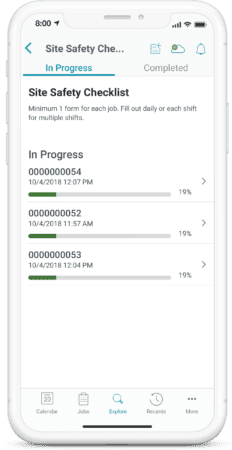Editor’s Note: Unlike many other job roles, field service workers can’t keep the world running during a crisis like COVID-19 while working from home. Our #CombatCorona series highlights the incredible work that companies whose workers and equipment are on the frontlines of this fight are doing during this challenging time.
Throughout the current COVID-19 pandemic, field service organizations around the globe have been working harder than ever to keep the world running. Some field service organizations have pivoted their production to meet the increased need for ventilators, testing kits, and PPE. Others have ramped up operations to ensure essential goods like food, water, and medicine make it to our doors. In this article, we will look at the ways companies are leveraging field service technology to adapt to the new normal of service work.
Customer Communication
COVID-19 has required many organizations to rethink their service operations, especially when it comes to how they communicate with customers. In the utility sector, where many essential service appointments still require sending out a field technician, service organizations are leveraging customer communication apps that allow for contactless service. With this technology, service organizations are able to send real-time alerts to customers and provide “Uberized” tracking of service personnel. With access to quick and easy communication, end-customers receive clear instructions prior to appointments to ensure transparency and first-time access.
Localz, a mobile workforce solution that integrates with ServiceMax, is helping a large equipment rental company send end-customers precise ETAs and notify customers that they don’t need to greet the driver upon arrival. During collection and deliveries, the customer is able to communicate directly with the driver via SMS or phone and authorize the order with a one-time security PIN. These contactless service calls are preventing downtime on critical equipment while ensuring technicians and customers stay safe.
Safety Checklists & Document Generation
Since the COVID-19 outbreak, service organizations in all industries have had to find ways to inform technicians of new safety policies and procedures. Mobile checklists have become instrumental in ensuring that engineers follow onsite guidelines to protect their own and their customers’ health.
 Providers like ProntoForms offer contextual, custom apps that allow field employees to reliably complete complex safety checklists and compliance forms on their mobile devices. Service organizations that have adopted this technology have been able to rapidly build and scale complex forms and checklists to ensure worker safety and compliance.
Providers like ProntoForms offer contextual, custom apps that allow field employees to reliably complete complex safety checklists and compliance forms on their mobile devices. Service organizations that have adopted this technology have been able to rapidly build and scale complex forms and checklists to ensure worker safety and compliance.
As businesses prepare for the new normal of service work, these checklists can easily be iterated to match evolving safety guidelines across regions, languages, and processes.
Compac, a provider of fruit sorting solutions, has taken this a step further by providing customers with iPads that contain ProntoForms’ apps for step-by-step procedures to repair machine issues. Using these checklists, customers have been able to solve issues on their own, preventing the need for Compac service technicians to visit in-person.
In addition to using digital forms and checklists to make work safer, companies have also been leveraging document generation technology, like that of Nintex, to instantly create compliant digital documents like contracts, work orders, and invoices. Using Nintex, companies are able to automate the creation of documents as well as the workflows that ensure the documents make it to the right people, all without paper changing hands. This technology is even being used to enable contactless check-in at drive-through COVID-19 testing sites. Nintex document generation allows health workers to digitally capture intake form information, receive confirmations from patients, and generate bar codes that allow for contactless check-ins and results follow-up.
AI, AR & IoT
The popularity of artificial intelligence, augmented reality, and the Internet of things has been growing among field service organizations. Forward-thinking businesses have begun using these innovative technologies to remotely diagnose failures, train technicians, and aid in scheduling. Remote diagnostic capabilities are especially important right now as service companies are looking to reduce in-person service calls as much as possible.
Aquant, a service intelligence platform, offers Ignite, a free self-service diagnostic tool that service organizations can add to their websites. When a customer encounters an issue, they can use the triaging tool to diagnose, and in some cases resolve, simple issues remotely. The tool scours a company’s unique service knowledge, taking information directly from manuals and guides. That ensures recommendations that are specific to each organization.
Spoke IoT, a provider of cutting-edge AI and IoT field service solutions, is helping companies reduced on-site visits with remote monitoring and diagnostics. Prior to COVID-19, a major perimeter security provider with over two thousand locations in the United States was burdened by the maintenance requirements of its installed assets. When the pandemic struck, quarantines severely limited the company’s ability to visit customer sites, exacerbating maintenance challenges. Using Spoke’s IoT solution, this customer is now able to remotely monitor its installed base of equipment, significantly reducing the need to send technicians to customer sites.
On the internal side, service organizations are using AR technology like that of Scope AR to provide technicians with an immersive, digital training experience on life-sized, full-scale models of equipment. Experts are also using Scope AR’s remote assistance functionality to remotely guide factory floor workers through essential equipment repair and maintenance procedures via live, AR-enabled video calls. This is preventing costly downtime and ensuring procedures are done correctly by workers who may have little to no prior training on a certain task.
Beyond remote diagnostics and training, AI is also being used to directly fight the current pandemic. TCS, a leading consultancy firm that helps field service companies implement new technology, is using AI to identify chemical compounds that could potentially be used to fight COVID-19. Scientists Navneet Bung, Gopalakrishnan Bulusu, Sowmya Ramaswamy and Arijit Roy have already found 31 new promising chemical compounds.
As the industry adjusts to the new normal, we expect to see innovative technology continuing to play a big role in the adaptability, flexibility, and success of field service organizations.
Continued Reading:


Share this: